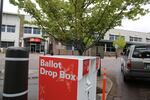The pandemic is wreaking havoc on the economy, but it didn’t stop Oregon voters from approving a long list of local tax measures in Tuesday’s primary.
Related: Fagan Overtakes Hass In Democratic Secretary Of State Race
Whether it was passing a new $248 million
tax for homeless services in the Portland
area or kicking in another $1 million a year in property taxes for fire and emergency services in the Central Oregon city of Redmond, voters were willing to say yes at a rate that surprised many political observers.
Portland pollster John Horvick said he counted some 36 tax measures that appeared to pass Tuesday, versus only 12 that were failing.
“If you told me two months ago, ‘We’re going to have a pandemic and there’s going to be a collapse in employment … I would have said, ‘Boy, tough times for local ballot measures,’” said Horvick, who works at DHM Research. “I had clients who took things off the ballot, and I bet they’re kicking themselves now.”
Nine school districts, including Lane Community College, had measures on the ballot, and five of them passed. That is a typical success rate for school tax measures, since many districts test the temperature of voters at the May primary and then try with a revised pitch in November if they don’t succeed.

Primary election voting in Bend, May 19, 2020.
Emily Cureton / OPB
“Given the times and the whole issue around the virus, I think the school districts have to be pleased with the outcome,” said Jim Green, executive director of the Oregon School Boards Association. His association keeps a database of school tax measures going back to 2006, and it shows a passing rate of 51%.
The overall success of the local tax measures gives further encouragement to agencies planning to go to voters in November. Perhaps most notably, Metro — the Portland regional agency that sent the homeless services tax to voters — is looking at a major transportation funding package at the general election.
Failure of the homeless measure, which provides services for those moving off the street and into housing, could have caused Metro to reconsider.
But Metro Council President Lynn Peterson said she and other officials will continue to work on putting together a package of transportation improvements that would be funded by some mixture of vehicle registration and payroll taxes.
“I think people recognize they have to invest in themselves,” Peterson said of her thinking after Tuesday’s election. “There’s no federal government that is going to bail us out of our issues, whether it be homelessness or transportation.”
Jason Williams, who heads the Taxpayer Association of Oregon, campaigned against the homeless services measure. He said voters were anxious to reduce homelessness and were presented with a well-funded support campaign that said the new tax would fall on well-to-do taxpayers and larger corporations.
“The idea of actually being in a recession” has perhaps not arrived for many voters, said Williams, noting how quickly the pandemic shut down so much economic activity.
Related: Portland Voters Favor Renewing Gas Tax
Voters in the Portland area, which is more liberal than much of the state, were particularly willing to approve tax measures.
Portland voters extended the city’s 10-cent gasoline tax
while voters in Washington County also renewed public safety and library levies. Voters in the Canby School District approved a $75 million bond measure while Centennial School District voters in east Multnomah County appeared to be passing a $65 million bond measure.
In Redmond, the $5.5 million over five years in new property taxes will pay for new equipment for paramedics and fire fighters and maintain current levels of service. In Columbia County, voters approved $13.4 million to keep the jail open and pay for repairs. In Lane County, voters approved the largest bond measure of the election, $121.5 million for building and program upgrades at the local community college. In the latter case, backers pitched the bond measure as providing more job training to help the area recover from the recession.
Still, voters did reject several tax measures. In Roseburg, voters turned down a $94 million bond measure after the Roseburg News-Review editorialized against it. The paper said the improvements were needed but concluded that “it’s too risky to support an additional tax” when so many county residents don’t know “whether their jobs will return as swiftly as they hope.”